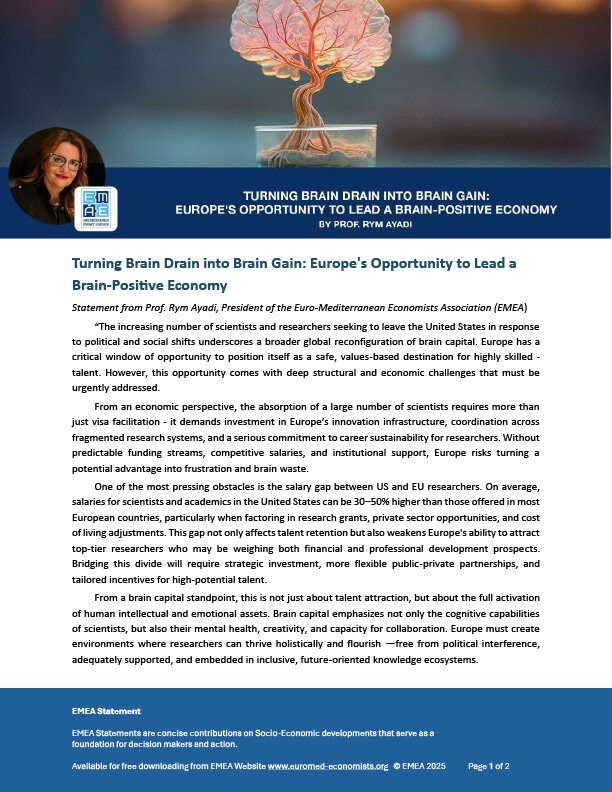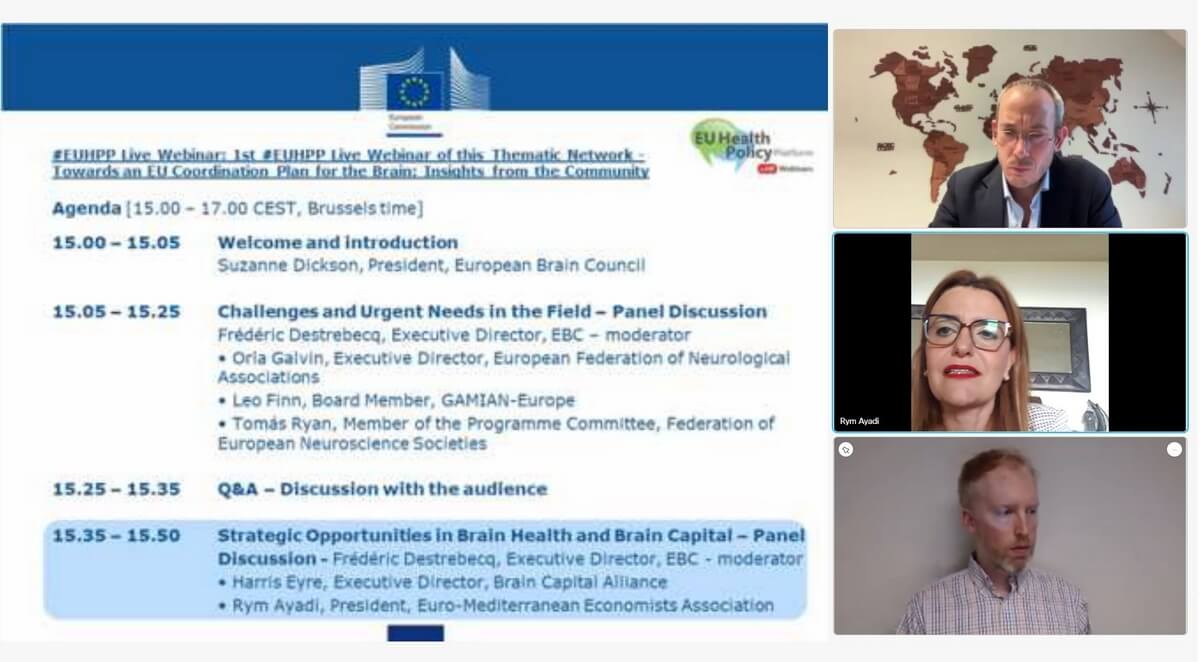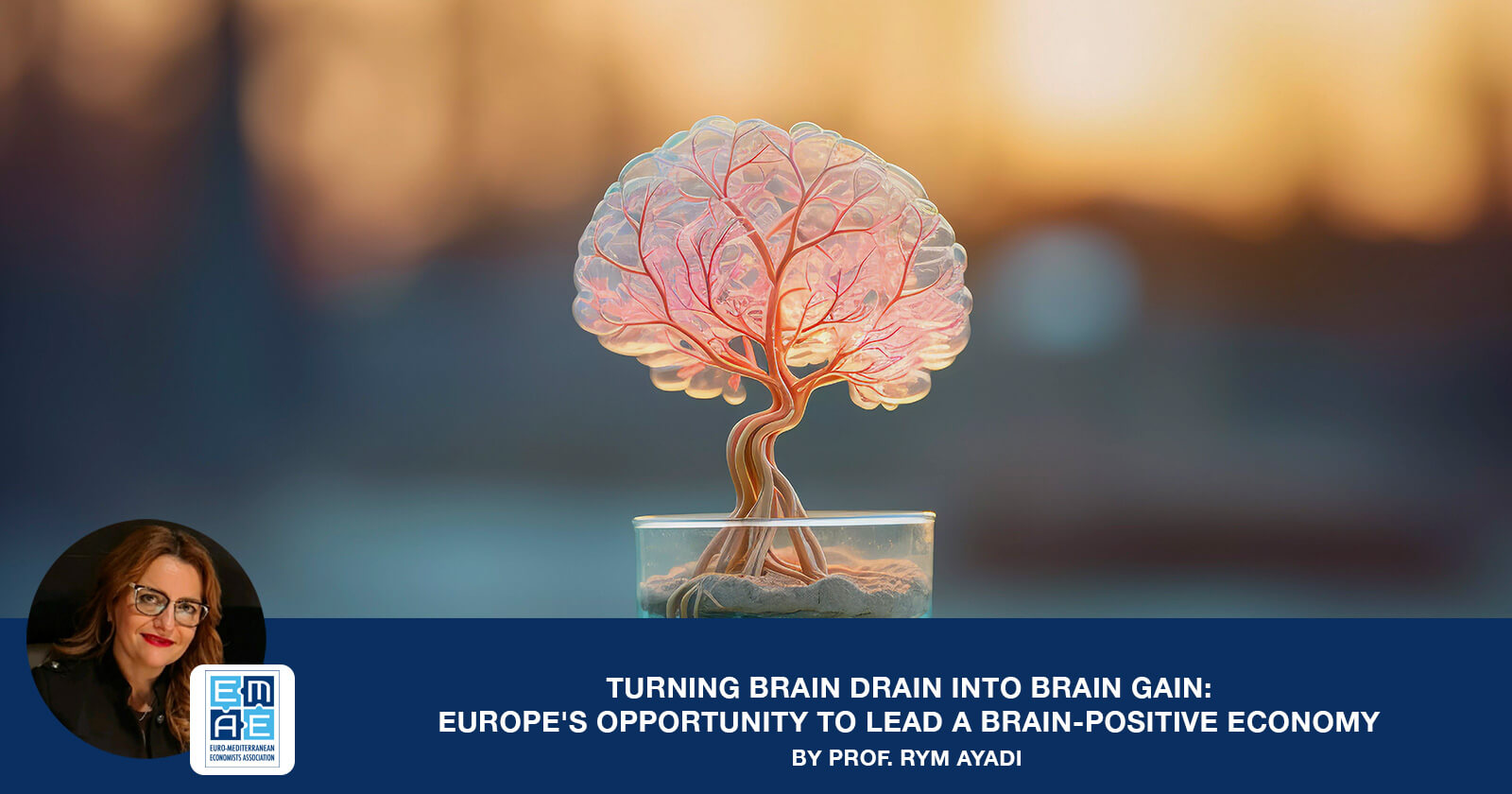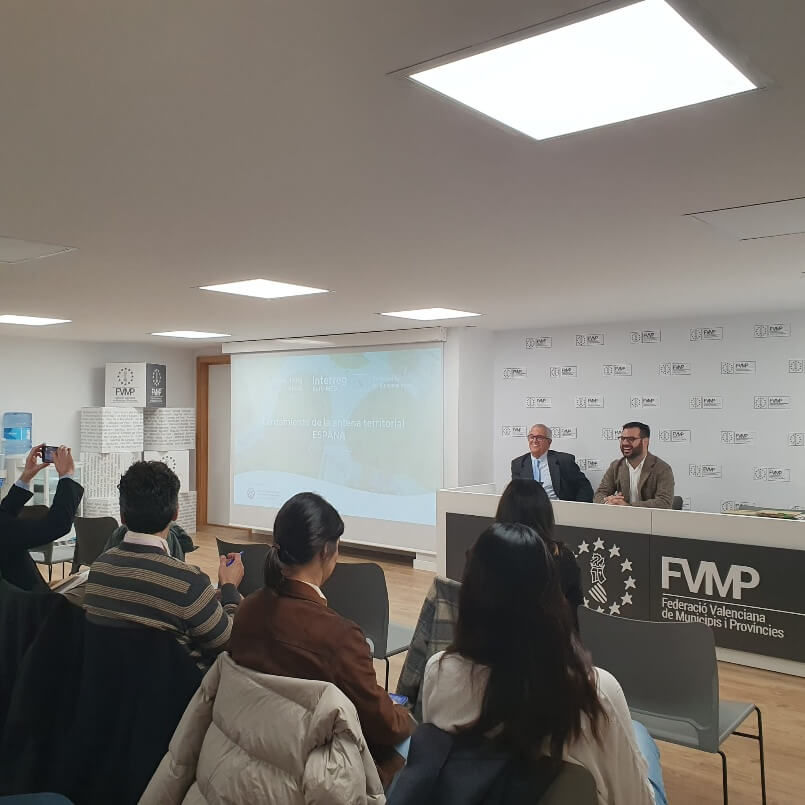The President and Founder of EMEA, Prof. Rym Ayadi, Professor at Bayes Business School, City University of London, co-founder of the Brain Capital Alliance, and Dr. Harris Eyre, Lead of Neuro-Policy and Senior Fellow at Rice University’s Baker Institute for Public Policy, Executive Director, Brain Capital Alliance and EMEA Advisor, were among the high level experts that participated at the webinar “Towards an EU Coordination Plan for the Brain: Insights from the Community” which took place online on 05 September 2024.
The event was organised by the European Brain Council in response to the European Commission’s invitation to stakeholders to make a proposal for its next cycle of Thematic Networks under the EU Health Policy Platform (EU HPP). This Thematic Network aims to unite stakeholders from across the brain community to develop policy recommendations for a comprehensive European Brain Health, Research and Innovation Plan.
Prof Rym Ayadi and Dr. Harris Eyre participated in the Panel Discussion “Strategic Opportunities in Brain Health and Brain Capital” which was moderated by Frédéric Destrebecq, Executive Director, European Brain Council.
In her intervention Prof. Rym Ayadi highlighted “Investing in brain health is investing in the future of our economies. A brain-positive economy prioritizes cognitive well-being, fostering innovation, productivity, and resilience. By embracing brain capital, we pave the way for a more sustainable, inclusive, and thriving society.”
Prof. Ayadi also underlined the following key recommendations for advancing brain health as a cornerstone of a brain-positive economy
- *Prioritize Brain Health in Public Policy*
– *Integrate brain health* into national and EU-level healthcare, education, and labor policies to ensure comprehensive support for cognitive well-being.
– Develop frameworks for *mental health promotion* and early intervention to reduce the long-term social and economic costs associated with brain disorders. - *Promote Lifelong Cognitive Development*
– *Revamp education systems* to focus on cognitive development from early childhood through adulthood, emphasizing critical thinking, problem-solving, and emotional resilience.
– Create opportunities for *lifelong learning* and upskilling, ensuring that workers can adapt to technological advances and changing job markets. - *Invest in Brain-Friendly Workplaces*
– Encourage organizations to design *work environments* that promote mental well-being, reduce stress, and enhance productivity.
– Foster a culture of *mental health awareness* in the workplace, supporting employee wellness programs that prioritize cognitive and emotional well-being. - *Adopt and Leverage the Global Brain Capital Dashboard*
– Use the *Global Brain Capital Dashboard* to track brain health and brain capital metrics across regions, identifying areas that need investment and policy reform.
– Leverage data-driven insights from the dashboard to guide *targeted investments* in education, healthcare, and workforce development. - *Promote a Brain-Positive Economy*
– Encourage policymakers and businesses to recognize *brain capital* as a critical asset for innovation, productivity, and long-term economic growth.
– Foster *cross-sector collaboration* between governments, academic institutions, and the private sector to align brain health initiatives with economic goals. - *Support Systemic Change Through Investments*
– Direct *increased investment* into brain health research, mental health services, and cognitive development programs.
– Focus on *preventative measures* to reduce the incidence and impact of mental health issues, ultimately lowering long-term healthcare costs and boosting economic productivity. - *Foster Societal Awareness*
– Raise awareness among the public, employers, and policymakers about the *importance of brain health* in achieving both individual well-being and socio-economic progress.
– Promote campaigns that reduce the *stigma* surrounding mental health issues, encouraging people to seek support and fostering a culture of openness.
By implementing these recommendations, the EU can lead the transition to a brain-positive economy that values human cognitive potential, promotes well-being, and drives sustainable economic growth.
From his side Dr Harris Eyre underlined “Profound economic transitions are on the horizon, offering the potential to unlock greater socio-economic sustainability, productivity, and well-being. Yet, history has shown such transitions can be challenging. Brain health and brain skills hold the key to successfully navigating these imminent, skills-based shifts with greater ease. To secure the best possible future for our nations, we must prioritize and invest in brain health and brain skills and the research that supports them. By doing so, we can pave the way for a brain-positive economic transition — one that fosters a resilient and innovative brain economy.”
The primary aim of the DG SANTE’s Thematic Network “Towards an EU Coordination Plan for the Brain”, is to prepare a joint statement which will present the collective vision and strategic recommendations for enhancing brain health policies and practices across Europe.
The 1st webinar, organised by EBC, served as a platform for discussing ideas, sharing insights, and fostering collaboration among participants before the final drafting of the Joint Statement. The second draft of the position paper will be shared in October and discussed in a second webinar. The finalized Joint Statement will then be presented by the European Brain Council at the EU Health Policy Platform Annual Meeting.
Check the video of the EMEA webinar “Brain Health is Essential for Smooth Economic Transitions – Toward Socio-Economic Sustainability, Productivity, and Wellbeing”





